As a Black mom of three, Black Maternal Health is a topic that hits close to home for me.
Giving birth is a scary thing.
Giving birth in America as a black mom can be even scarier.
There are so many uncertainties, especially for the first time.
And let’s be real; there’s a lot of talk out there about Black Maternal Health and the challenges that come with it.
I’m here to share my own experiences and give you some advice on how to advocate for yourself and have a successful natural birth, no matter what the odds may be.
This post is all about Black Maternal Health.
Hey, I’m Victoria Vaden – a married mom of three beautiful kids and an ex-YouTuber who vlogged each of my births.
Now, I’m a Children’s Author with a passion for sharing my experiences and empowering other Black women to take control of their own birth journeys.
So, let’s talk about how you can advocate for yourself and have a successful natural birth, even in the face of the challenges that come with Black Maternal Health.
As a black woman in America, I knew the statistics were against me.
Black women are three to four times more likely to die from pregnancy-related complications than white women. And we are more likely to have c-sections than any other race.
Centers for Disease Control and Prevention (CDC)
But I didn’t let those statistics scare me.
I did my research, advocated for myself, and had three successful natural births.
And I want to share my story with you, so you can do the same.
Disclaimer, Because It’s Necessary
Before we dive any further, I want to be crystal clear: I am not a medical professional, and nothing in this post or on this blog should ever be perceived as medical advice.
I’m just a Black woman who has experienced Black Maternal Health firsthand, and I’m sharing my experiences as I write this from the comforts of my bed.
Never take advice from a complete stranger on the internet as a substitute for medical advice from a licensed professional.
Always consult with your healthcare provider before making any decisions regarding your own health and the health of your baby.

Need to Jump Ahead?
Black Maternal Health: The Grim Reality
First, let’s talk about the grim reality of black maternal health care in America.
According to the CDC, black women have a maternal mortality rate of 37.1 deaths per 100,000 live births.
That’s compared to 14.7 deaths per 100,000 live births for white women.
But it’s not just the statistics on black maternal health mortality that’s the problem.
Black women are also more likely to experience complications during pregnancy and childbirth, such as pre-eclampsia, gestational diabetes, and postpartum depression.
And we are more likely to have c-sections, which come with their own set of risks and complications.
Why is this happening?
Well, there are a lot of factors at play, particularly disparities in black maternal health.
Institutional racism and bias within the healthcare system are big ones.
Black women are often not taken seriously when we report symptoms or concerns, and our pain is often dismissed or downplayed.
There’s also the issue of access to healthcare.
Black women are more likely to live in areas with limited access to quality healthcare, and we are more likely to be uninsured or underinsured.
And then there are the social determinants of health, such as poverty, lack of education, and exposure to environmental toxins.
All of these factors can contribute to poor maternal health outcomes.
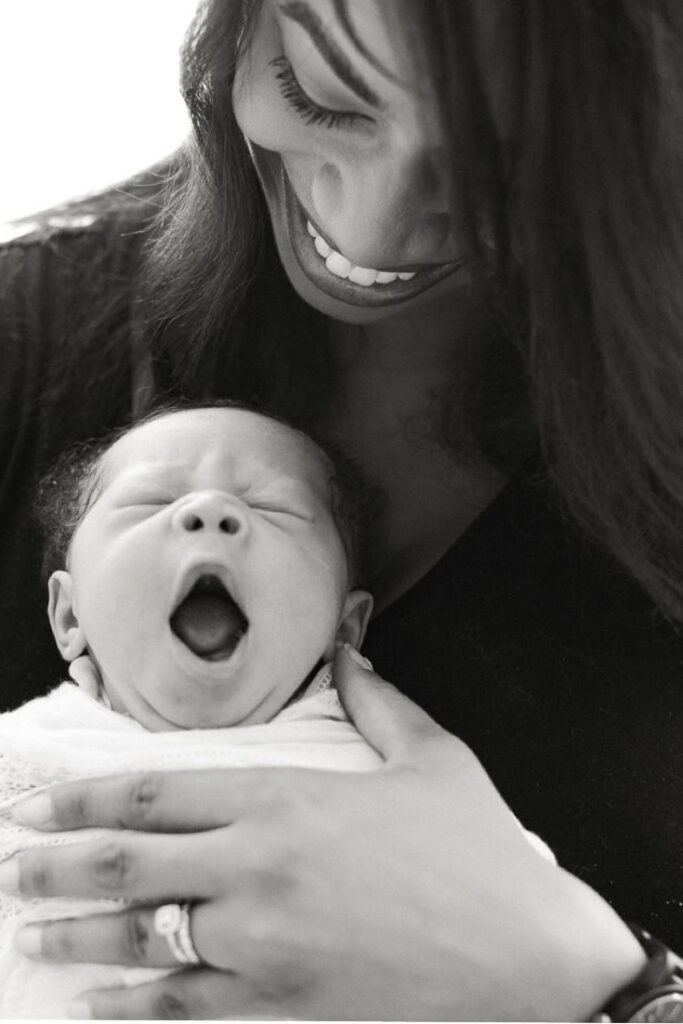
My Complicated Medical History
Before we dive into my birth stories, I want to share a bit about my medical history.
I’ve had a complicated record from a weakened immune system (and extremely terrible allergies) since my own birth to the point that my medical record in college was the size of a small textbook.
This made me even more determined to have a natural birth, because I knew my body could handle it after years of educating myself about my own health.
But because of previous (and some current) health concerns, it made it difficult to choose a birthing center.
While I loved the idea of a peaceful, home-like environment, I needed the extra medical attention and equipment that a hospital could provide.
And unfortunately, my insurance barely covered the cost of a birthing center, so it wasn’t a realistic option for me.
Hospitals vs. Birthing Centers
Now, let’s talk about the benefits and cons of hospitals vs. birthing centers.
While birthing centers can provide a peaceful, home-like environment and more personalized care, they may not have the same medical equipment and expertise as hospitals.
And if you have any health concerns or risk factors, a hospital may be a better option for you.
On the other hand, hospitals can provide more medical attention and equipment, which can be reassuring if you have any concerns about your birth.
However, they may not provide the same personalized care and attention that a birthing center can offer.
Ultimately, the decision between a hospital and a birthing center is a personal one that should be based on your individual needs and preferences.
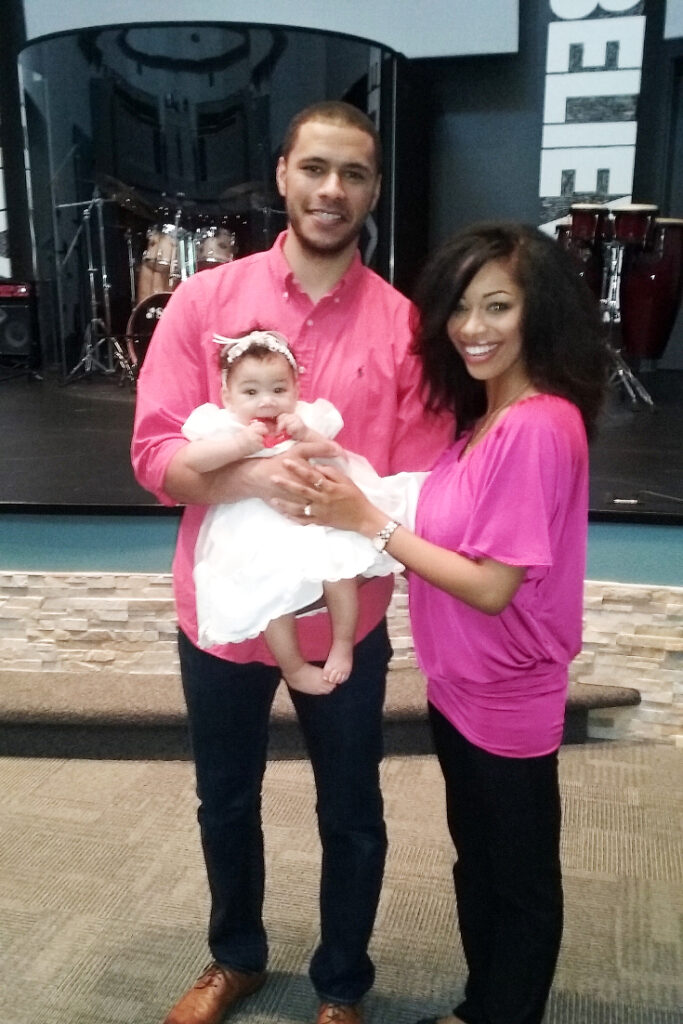
My First Birth Experience
It was a wild ride, let me tell you.
The first trimester was a doozy with all the crazy mood swings and food aversions.
I mean, I couldn’t stand the thought of Mexican food, which is usually my jam.
But you know what I was craving? Fun Dip. Yes, the sugary candy from our childhood.
And Olive Garden salad, of all things. Pregnancy is weird, man.
Anyway, once I hit full term, things got even crazier.
My baby girl, Mya, loved to lay on the sciatic nerve near my left hip.
Talk about painful!
I remember one time I was giving a presentation at work (I was in college admissions at the time), and all of a sudden, I felt like I was going to collapse to my knees.
I had to excuse myself from the room and a colleague finished my presentation.
So, needless to say, I was ready to give birth.
And luckily, I was chosen to be part of a study at my hospital which is the top research facility in my state.
The study was looking at whether it was healthier for women to give birth before or after 41 weeks, and I was randomly selected to be part of it.
(Thank God!)
I ended up giving birth at 39 weeks, and it was an amazing experience.
Now, I know what you’re thinking – “Victoria, didn’t you have an epidural?”
And the answer is yes, I did since I elected to give birth early.
Here’s the thing – I was actually bumped a day later (last minute) to an emergency c-section, and I didn’t sleep for nearly 40 hours since I was ready to head into the hospital the night before.
So when they offered me an epidural, I was like, “Yes, please.”
After that epidural, I slept for what felt like two hours. It was glorious.
And when it came time to push, it was a breeze.
Mya practically flew out with just three pushes.
I couldn’t believe it.
It was an amazing experience, and it set the tone for my future (and even faster) births.
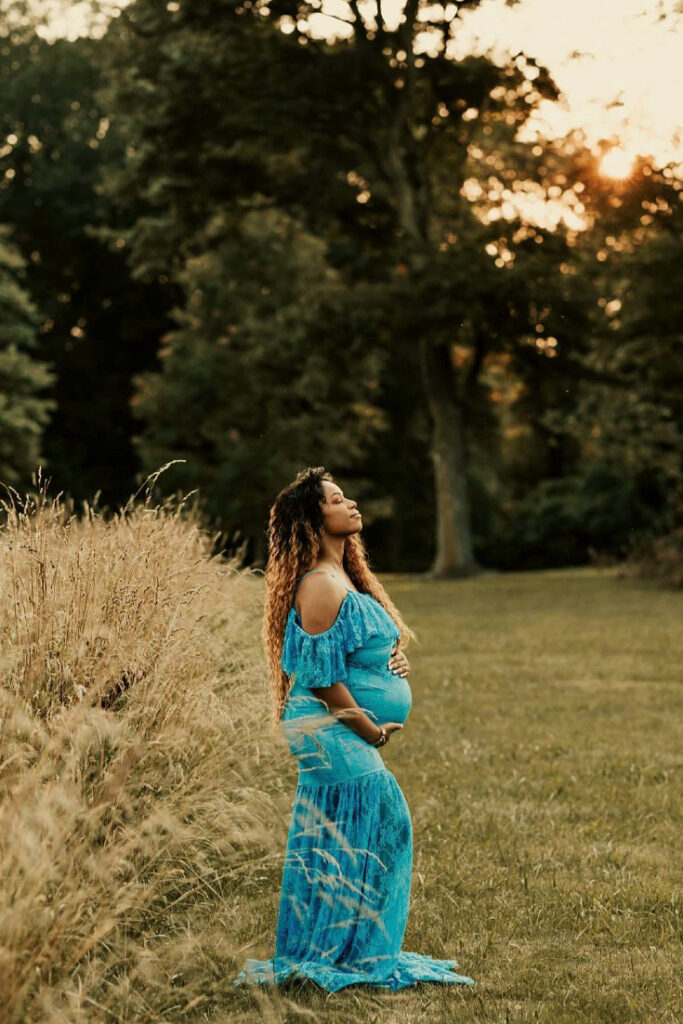
What Is Black Maternal Health Week?
Let me take a quick break from my birth stories to talk about something important – Black Maternal Health Week.
You may have heard of it before, but if not, let me fill you in.
Black Maternal Health Week is a week-long campaign that aims to raise awareness about the high rates of maternal mortality and morbidity among black women in the United States.
This campaign was started in 2018 by the Black Mamas Matter Alliance, a group of individuals and organizations who are committed to advancing black maternal health, rights, and justice.
So, why is Black Maternal Health Week so important?
Well, let’s start with some statistics.
Black women in the United States are three to four times more likely to die from pregnancy-related complications than white women.
And this disparity is even starker for black women who live in rural areas, have lower incomes, or have less access to healthcare.
This is a serious issue, and it’s one that needs more attention and action.
Black Maternal Health Week aims to do just that.
Through events, discussions, and social media campaigns, this week-long event brings together individuals, organizations, and communities to raise awareness, share resources, and advocate for change.
So, if you’re interested in learning more about black maternal health and how you can get involved, I highly encourage you to check out the Black Mamas Matter Alliance website and social media channels.
There are so many resources and opportunities to get involved and make a difference.
Thanks for letting me take a quick detour to talk about something that’s so important to me.
Okay, now back to my birth stories.
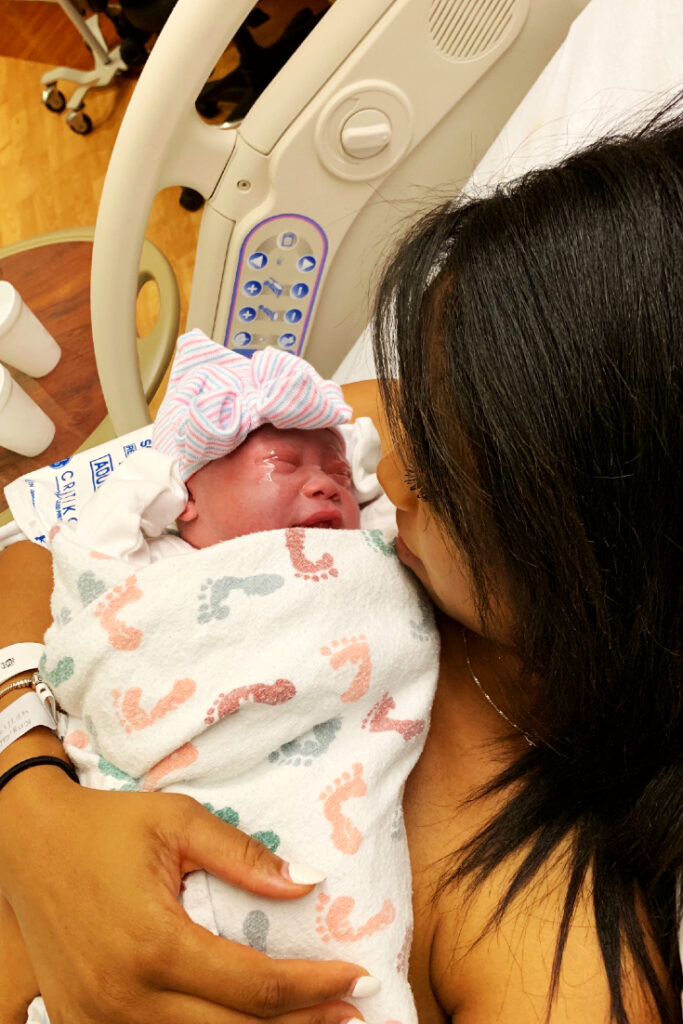
My Second Birth Story
This time around, we were living in Florida and I gave birth to my second daughter, Mariah.
Hands down, it was the most pleasant birth experience I’ve had yet.
Now, you know how with all of my births, my water never broke?
Well, that was the case with Mariah too.
So, I needed the assistance of the medical staff to help get things moving even though I was contracting normally and progressed to 4 centimeters on my own.
Since we were in Tampa, the view outside the hospital room was stunning.
It was a water view, and it made everything feel so serene and peaceful.
And get this – our daughter Mya was able to be present during the entire birth experience!
At the time, we were 17.5 hours away from all of our family and friends, so it was just the three of us.
Mya was 4 years old, and we weren’t sure how she was going to handle seeing mommy go through labor.
She did great, and it was a special experience for all of us.
Admittedly (and I suppose stereotypically), I’ve always done well with pain (yes, even with labor pain).
And with Mariah’s birth, I didn’t feel excruciating pain at all and did it without an epidural this time.
I could talk through all of my contractions, and was actually on the phone with my best friend until about 7 centimeters.
But that ring of fire? Yeah, I felt it.
It was like my vagina was being ripped open.
But hey, I beat my own record, because I had a ONE PUSH delivery!
Overall, Mariah’s birth was an amazing experience.
It was peaceful, serene, and surrounded by the love of our little family.
And I’m so grateful that Mya was able to be there with us to witness her little sister’s arrival into the world.
Oh, and I almost forgot to mention – I filmed each of my births on YouTube!
So if you want to see what it was really like to give birth naturally, check out my channel.
Shameless plug, I know, but I want to share my experiences so it can hopefully help another mom-to-be.
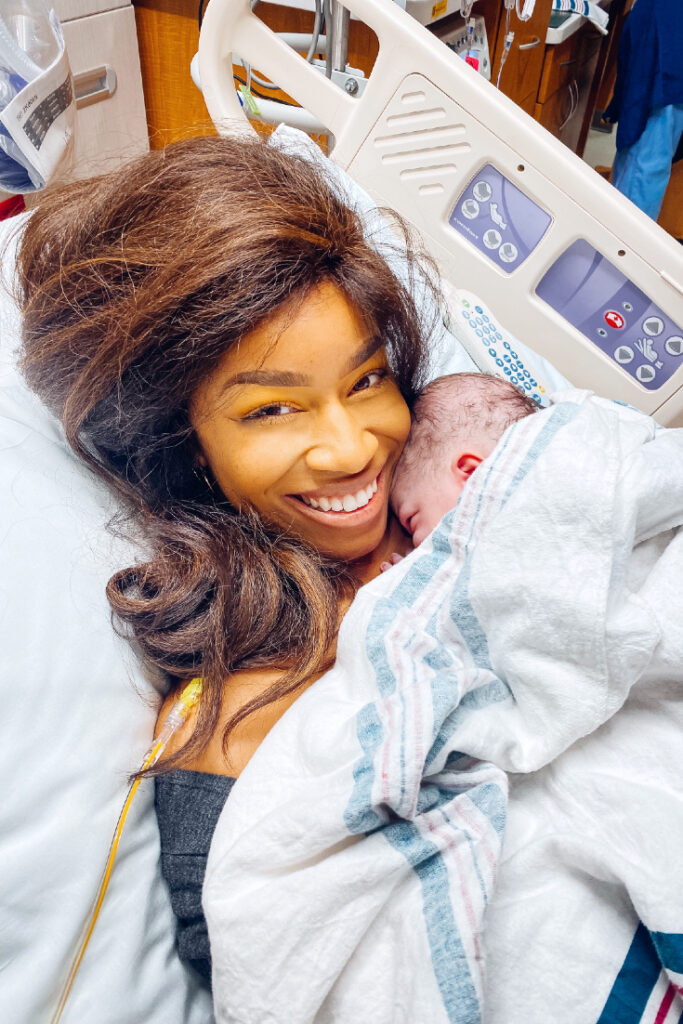
My Fastest (and Final) Birth
This time around, we were welcoming our first boy, Noah, into the world.
Honestly, it was a bit more tiring than my pregnancies with my girls.
I maintained the same advice I gave earlier – educate yourself, advocate for yourself, and surround yourself with supportive healthcare providers.
Thankfully, I was birthing at the same hospital that I gave birth to Mya in, so everything was familiar to me.
I was still in the hospital’s system and familiar with the hospital and medical staff.
But, the weeks leading up to Noah’s birth were hectic.
We had just moved a few months prior (like, across the east coast) and were doing minor renovations in the house.
And I was taking care of Mya and Mariah all day every day until school began (Noah was actually born on the first day of school).
As if that wasn’t enough, we also adopted a second dog – a Golden Retriever we renamed Takoda – the week before I gave birth.
Talk about adding to the chaos!
I also had preterm labor with Noah for two weeks but didn’t actually give birth until a few days after my due date.
But, when actual labor set it, the labor contractions were no joke.
They were excruciating, and I begged for an epidural.
But get this – as soon as they put the epidural in, I laid back and gave birth!
And yes, I still had to pay for the epidural that I didn’t even get to use. Ugh.
But before I actually pushed Noah out, the medical staff had to once again, break my water.
But before doing so, we hit a snag.
My OBGYN actually had to push Noah’s arm back into the “down” position (aka by his side), because he had his arm raised (like in class) petting the doctor’s hand while she was trying to break my water.
Can you imagine if my water broke and he was born with his arm coming out first?
That would have been a disaster.
So yes, the single push was a little painful for me, but it all worked out in the end.
Overall, Noah’s birth was a bit more chaotic than my previous ones, but it was still an amazing experience.
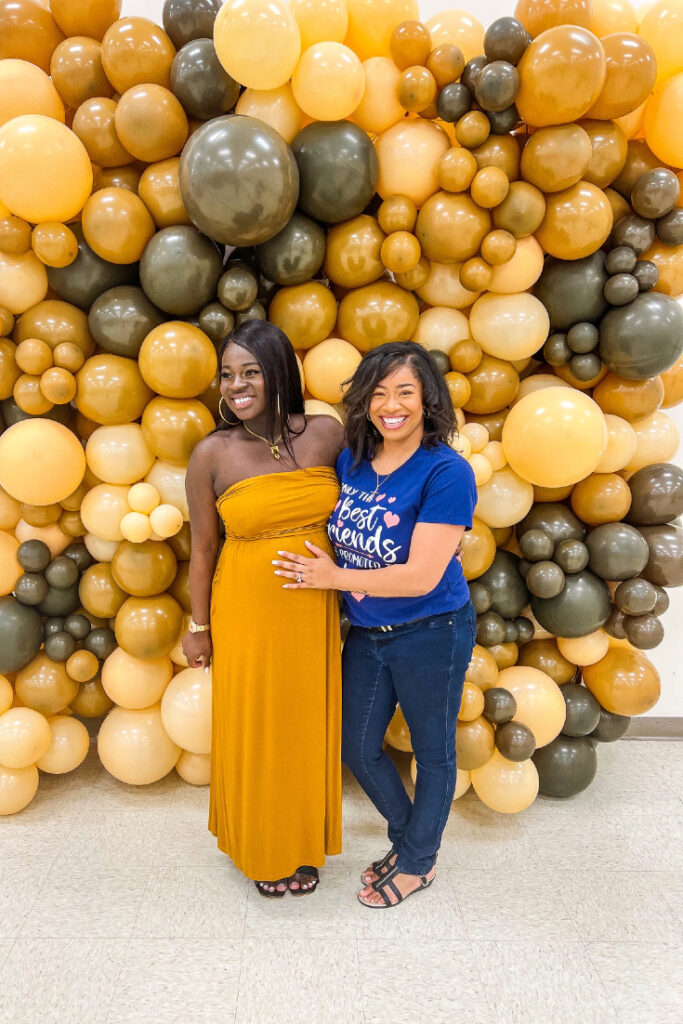
The Importance of Learning to Advocate for Yourself
Let me take a moment to stress something that’s incredibly important when it comes to giving birth – advocating for yourself.
You know your body better than anyone else, and no one is going to pressure you into birthing in a way that doesn’t feel necessary or right for you.
Now, I know that doctors and medical staff are there to help and guide you in your pregnancy journey through birth.
But it’s important to remember that you have a say in the process.
You can ask questions, voice your concerns, and make decisions about your own body and your own health.
For me, I was fortunate to be well-informed about my hospital and healthcare providers, thanks to my lengthy health record.
And even in Florida, where the healthcare system can be a bit chaotic, c-sections were never discussed with me.
I have to assume it’s because of my successful, and rapid births with my first two children.
However, I do want to acknowledge that not everyone has had the same experience as me.
It’s saddening to hear that so many women, even my own best friends, have felt like they weren’t heard and were either forced or encouraged to get c-sections.
This is why it’s so important to advocate for yourself and know your options.
And for those who may be dealing with prolapse or other health concerns, it’s important to do your own research and talk to your healthcare provider about what’s best for you.
I actually have a post here about my experience with vaginal stage three prolapse (that happened because of my quick births).
Remember, you are in control of your own birth experience.
Don’t be afraid to speak up and advocate for yourself.
Your health and the health of your baby are the most important things, and you deserve to have a say in how that happens.

Advocating for Yourself: Tips for a Successful Natural Birth
If you’re a black woman who wants to have a successful natural birth, there are a few key things you can do to advocate for yourself and increase your chances of success:
#1 Know your body and your health:
Take the time to learn about your body and how it works.
This includes understanding the stages of labor, pain management techniques, and any health conditions you may have that could impact your pregnancy and birth.
#2 Do your own research:
Don’t just rely on what your healthcare provider tells you.
Take the time to read books, watch videos, and talk to other moms who have had natural births.
This will help you feel more confident and prepared.
#3 Have self-confidence:
Believe in yourself and your ability to give birth naturally.
Surround yourself with people who support your decision and believe in you.
#4 Generate your own birth plan:
Create a birth plan that outlines your wishes for your birth.
This will help you communicate your desires with your healthcare provider and ensure that everyone is on the same page.
#5 Communicate with your healthcare provider:
It’s important to have an open dialogue with your healthcare provider throughout your pregnancy.
Make sure they understand your desires for a natural birth and that you feel comfortable asking questions and expressing your concerns.
#6 Consider hiring a doula:
A doula is a trained professional who provides emotional and physical support during labor and delivery.
Having a doula by your side can help you feel more confident and supported during your birth.

This post was all about Black Maternal Health.
While the statistics around black maternal health in America are sobering, it’s important to remember that each birth story is unique.
As we wrap up, I hope that my experiences and advice have shed some light on the challenges that come with Black Maternal Health.
Despite the challenges that black women face in labor and delivery, it is possible to have a successful natural birth.
It’s so important to advocate for yourself and your health, especially as a Black woman.
And with Black Maternal Health Week upon us, there’s no better time to start having these conversations and making positive changes.
If you’re looking for more information on Black Maternal Health or just want to follow along with my journey of black motherhood, be sure to check out my related posts on Do You Even Mom.
And if you want even more real-time and real-life glimpses into my world, follow me on Instagram for extended clips and behind-the-scenes moments.
Remember, you have the power to make informed decisions about your health and the health of your baby.
And together, we can work towards a future where Black Maternal Health is given the attention and care it deserves.
Other posts you may like:
- How Pelvic Organ Prolapse Symptoms Are Ruining My Mom Life
- What No One Tells You About Postpartum Sex
- 9 Products To Get Rid of Postpartum Smell
